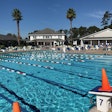Newberry, MI (Nov. 4, 2016) – Connor Sports® hosted a responsible forestry education event here today in partnership with The Nature Conservancy and the Newberry (MI) School District to begin the production process for the custom courts that will manufactured at Connor’s mill in Amasa, MI for the 2017 NCAA Men’s and Women’s Final Four.
The event held at the Newberry school, and later, at the 5,000 acre Tahquamenon School District Forest focused on providing a fun and real-world way to learn about responsible forestry for more than 400 Newberry students as part of the process of harvesting the timber for the 2017 Final Four courts. The event was highlighted by the felling of the first tree from the timber harvest that will continue through the next week in the Eastern Upper Peninsula in Michigan to supply the raw materials necessary for court production.
Newberry School students began the day at the school by enjoying a lumberjack breakfast followed by an assembly in the gymnasium featuring a Connor Sports video showing the production process of a championship basketball court and a lumberjack storytelling session. The students then listened to veteran timber industry experts talk about Newberry’s rich timber industry heritage and the valuable role the local community plays in the industry currently. Later in the morning the students traveled to the nearby school forest and learned first-hand from Connor Sports and The Nature Conservancy about strategic timber selection as certified by the Forest Stewardship Council (FSC).
“Sustainability and sports has always been a priority for Connor Sports and today’s educational forestry event with the Newberry School District was developed to show the students the process of responsible forestry and how those methods and products will be used for the official NCAA courts at the 2017 Men’s and Women’s Final Four,” said Jason Gasperich, Connor Sports Director of Sustainability.
Students observed hand cutting and tree selection; use of heavy equipment; sustainable forestry as it relates to wildlife; cutting of logs into lumber; and the “landing” area where the cut logs are staged and prepared for transport to the sawmill.
“Participating in this event was a great opportunity for us,” said Rich Bowman, The Nature Conservancy’s government relations director in Michigan. “We are focused not only on improving the health and sustainability of Michigan’s forests as a win for the environment, but also for the local communities such as Newberry that depend on those forests.”
Connor Sports Environmental Responsibility
• In 2009 an independent environmental engineering firm audited and designated Connor Sports a “Zero Waste Company.”
• As a member of the Maple Flooring Manufacturers Association (MFMA, Connor adheres to the strict grading and quality standards of that organization.
• Maple hardwood used in the courts is from a renewable resource, with the U.S. growing six times more hardwood than is harvested each year.
• Connor recycles 99% of its waste material and offers wood that is Forest Stewardship Council-certified. The FSC mark represents products from well-managed forests.
• Connor was the first MFMA member to be certified by the Rainforest Alliance, and is the only independently certified Zero Waste sports flooring manufacturer.
About Connor Sport Court International / http://www.connorsports.com
More athletic events are played on Connor Sport Court International surfaces than on any other sports flooring in the world. Founded in 1872, Connor Sport Court International has established themselves as the standard for professional and collegiate sports. Hardwood used in the courts is from a renewable resource, with the U.S. growing six times more hardwood than is harvested each year. Connor Sport Court International is proud to be the only sports surfacing company in the world that is independently audited and verified as “Zero Waste” and fully ISO 9001:2008 certified. Connor Sports is on Facebook at www.facebook.com/connorsports and on Twitter @Connor_Sports.
About The Nature Conservancy
The Nature Conservancy is a leading conservation organization working around the world to conserve the lands and waters upon which all life depends. In the Great Lakes region, the Conservancy works to make this among the most effectively managed ecosystems on Earth by protecting and restoring watersheds, forests, coastal areas and native fisheries. For more information, visit https://www.nature.org/en-us/about-us/where-we-work/united-states/michigan/?vu=michigan.































